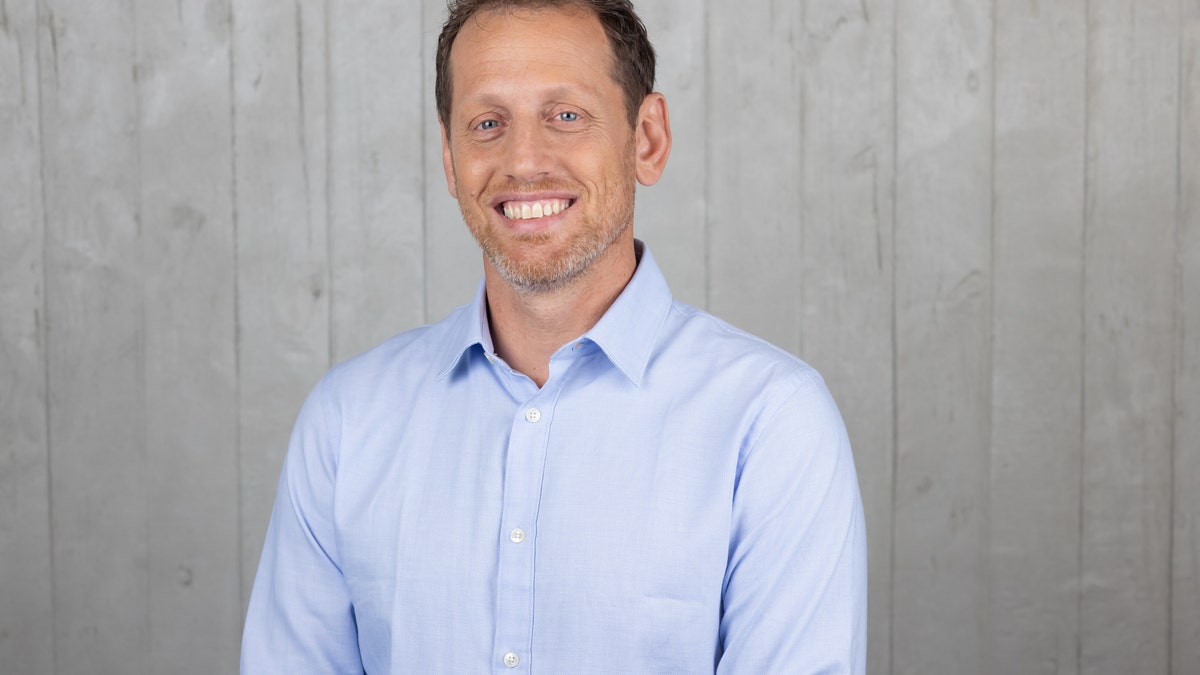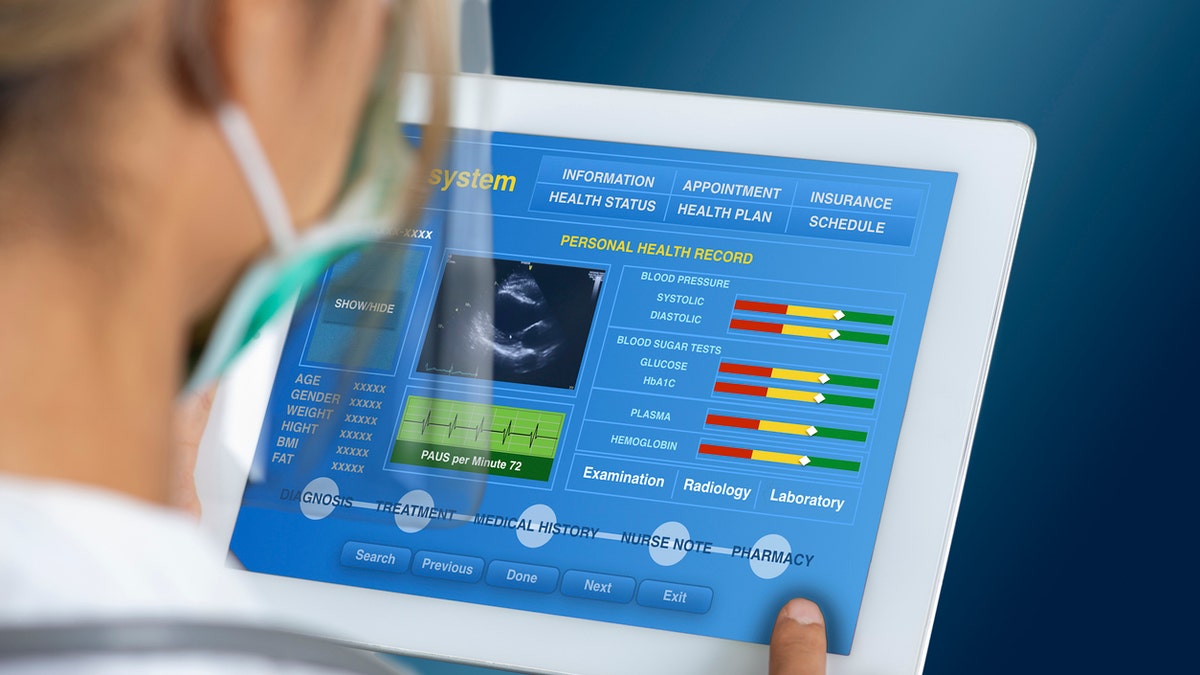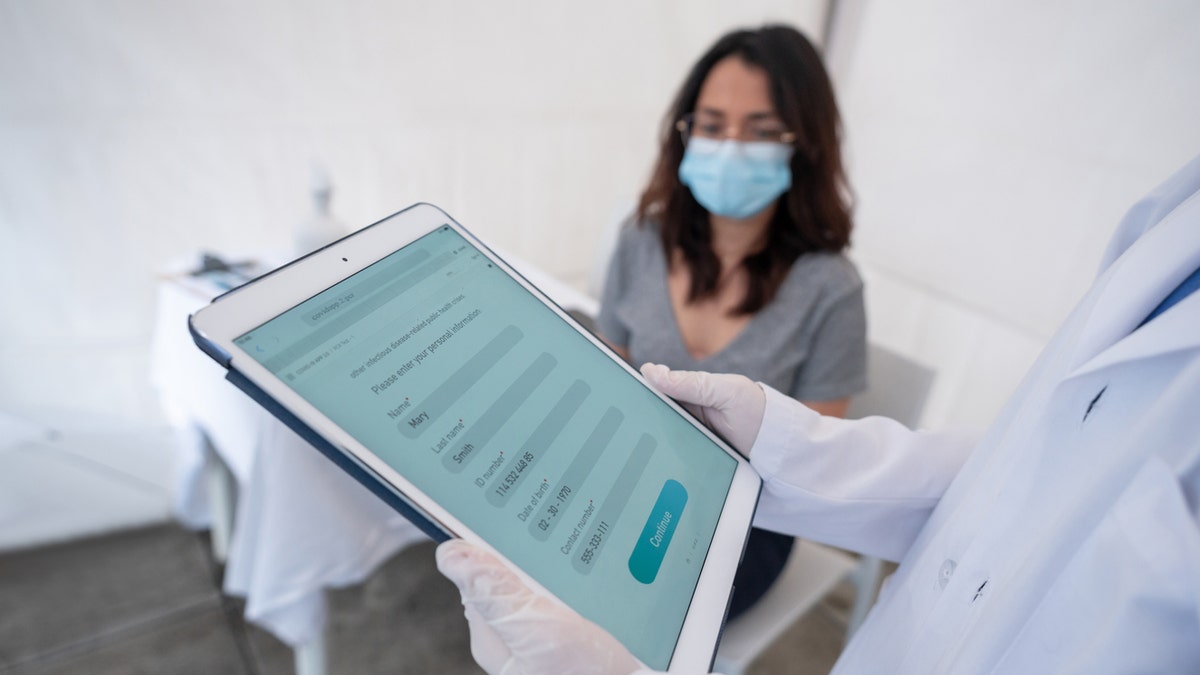Artificial Intelligence detecting cancer in some U.S. hospitals
Doctors believe Artificial Intelligence is now saving lives, after a major advancement in breast cancer screenings. A.I. is detecting early signs of the disease, in some cases years before doctors would find the cancer on a traditional scan.
For every patient visit, physicians spend an average of 16 minutes and 14 seconds using electronic health records to review data and make notes, according to a 2020 study in the Annals of Internal Medicine.
Navina, a New York-based medical tech company, has created an artificial intelligence tool to help doctors reclaim some of that time — and ensure that important data doesn’t get missed.
The platform, which is also called Navina, uses generative AI to transform how data informs the physician-patient interaction, explained Ronen Lavi, the company's Israel-based CEO.
ARTIFICIAL INTELLIGENCE IN HEALTH CARE: NEW PRODUCT ACTS AS 'COPILOT FOR DOCTORS'
Lavi said that the company's main goal "in bringing AI to the primary point of care was to make the patient-provider interaction more meaningful and effective by giving physicians deep patient understanding in the little time they have," he told Fox News Digital in an interview.
The problem of overburdened providers is a widespread concern, Lavi said.

The main goal "in bringing AI to the primary point of care was to make the patient-provider interaction more meaningful and effective by giving physicians deep patient understanding in the little time they have," said Ronen Lavi, CEO of Navina, in an interview with Fox News Digital. (Gadi Ohad)
"They have tons of data to sift through from multiple sources and in different formats," he continued.
"It’s disorganized, non-chronological and fragmented."
He added, "AI can process a high volume of data across sources and summarize complex medical jargon into simpler and shorter terms."
The second goal was for Navina to arm clinicians with insights that will shift care from reactive to proactive, Lavi said.
This could help catch disease risk factors sooner, facilitate quicker diagnoses and even save lives potentially.
CHATGPT FOR HEALTH CARE PROVIDERS: CAN THE AI CHATBOT MAKE THE PROFESSIONALS' JOBS EASIER?
"Navina gives physicians a complete set of tools they need to make clinical sense of data at the point of care, before or during their patient visit," he said.
The third goal in creating Navina was to help doctors better leverage the data at their fingertips to get financial credit from value-based programs such as Medicare and Medicaid for the care they provide, the doctor added.
Creating a ‘patient portrait’
At Central Virginia Family Physicians (CVFP), Navina has already helped doctors identify potentially life-threatening diseases, including diabetes with chronic complications, chronic kidney disease and morbid obesity.

For every patient visit, physicians spend an average of 16 minutes and 14 seconds using electronic health records to review data and make notes, a study found. Navina, a medica tech company, is aiming to address that. (iStock)
Concerned about the risk of staff burnout, Dr. Jarrett Dodd, medical director at CVFP in Lynchburg, Virginia, started looking for a tool that would allow his 52 physicians to move through the electronic health record in a quick and efficient way.
After learning that the American Academy of Family Physicians Innovation Lab had identified Navina as an essential technology for helping family doctors reduce burnout, he decided to give it a try.
"It gives me the information that I would not otherwise have had."
"Navina basically sits on top of our electronic health record and dives into the individual patient’s data," Dodd told Fox News Digital in an interview.
"It takes all of the important information and creates a ‘patient portrait,’ where all that information is much more easily accessible to the clinician at the point of care."
The tool compiles data from multiple sources — including lab results, imaging scans and notes from specialists — and presents it to the doctor in a clear, concise way.
AI HEALTH CARE PLATFORM PREDICTS DIABETES WITH HIGH ACCURACY BUT 'WON'T REPLACE PATIENT CARE'
For example, if a patient has been in the hospital recently, Navina would provide the discharge summary to the physician so he or she wouldn't have to dig for it.
For diabetic patients, Navina would look for their most recent hemoglobin A1C test to see their average blood sugar (glucose) level, as well as urine tests that might indicate damage to the kidneys.

Navina (not pictured) helps give clinicians insights that will shift care from reactive to proactive, the CEO of the company said, which could help catch disease risk factors sooner, facilitate quicker diagnoses and even save lives. (iStock)
Navina also goes beyond the patient’s record, reaching out to health information exchanges and pulling information from outside the organization, Dodd explained.
"If a patient of mine is seeing an endocrinologist that is not part of our group, I still have access to their test results through Navina," he said. "It gives me information that I would not otherwise have had."
NEW AI TOOL HELPS DOCTORS STREAMLINE DOCUMENTATION AND FOCUS ON PATIENTS
A physician simply enters a keyword to search across all results for certain conditions.
Certain diagnoses have higher "risk weights" than others.
"If I enter ‘pulmonary emphysema’ and a patient is identified on any imaging to have had emphysema, Navina will surface that as a possible diagnosis," he said.
"Nobody's coded it yet as a diagnosis, but it's there, buried in a document somewhere."
Navina has also helped CVFP’s clinicians do a better job with HCC (hierarchical condition category) coding, which helps to estimate a patient’s future health care costs by assigning risk scores for certain medical conditions.
Certain diagnoses have higher "risk weights" than others, Dodd said.

The new medical technology also goes beyond the patient’s record, reaching out to health information exchanges and pulling information from outside the organization. (iStock)
"HCC coding is really important in the value-based care programs that we're involved with, like Medicare Advantage and Medicare savings programs," he explained.
"When Medicare sets the budgets for how much money they're going to set aside to care for patients, they do it based on these risk codings," Dodd continued.
"So in order for us to communicate to Medicare how sick our patients are and demonstrate that we are delivering high-quality care, we want to make sure we're not missing any diagnoses."
"AI will help clinicians get through our day, do what we enjoy doing and remove the stuff that we don't enjoy doing."
The provider benefits also trickle down to the patients, the doctor explained, by bringing to light diagnoses that may have otherwise been missed.
"The physicians are going to approach the patient with all of the information they need to identify what the patient's risks are in the future, what sort of things they need to watch out for and how to guide the patient in a preventive way to keep them as healthy as we can," Dodd said.
‘Extensive validation and regulation’ needed
Lavi, Navina’s CEO, recognizes that just as with medical devices and treatments, there is a need for extensive validation and regulation to ensure that these systems are reliable and accurate.
AI TOOL GIVES DOCTORS PERSONALIZED ALZHEIMER’S TREATMENT PLANS FOR DEMENTIA PATIENTS
"When it comes to the clinical context, the reliability and bias reduction are enormously important," he said.
"On top of that, having worked closely with physicians for the past several years, I know that gaining the trust of the physician is no easy task," he added. "Solutions that are not bringing clinical evidence to the forefront will never gain traction."

Navina’s CEO recognizes that there is a need for extensive validation and regulation to ensure that these systems are reliable and accurate. (iStock)
Dodd is aware of the general concerns about using AI in the health care space, but he doesn’t foresee risks with the Navina tool.
"It’s designed to look for what we ask it to look for," he said.
CLICK HERE TO GET THE FOX NEWS APP
The tool doesn’t present any privacy risks, he noted, because it only accesses the information for the individual patient.
When it comes to the fact that some people are afraid AI is going to replace doctors, Dodd said he’s not buying into that fear.
CLICK HERE TO SIGN UP FOR OUR HEALTH NEWSLETTER
"I think it will be a phenomenal tool for physicians to apply to the benefit of our patients and to our own lives," he said.
"AI will help clinicians get through our day, do what we enjoy doing and remove the stuff that we don't enjoy doing, so that we're not burning out and looking for new careers by the time we hit 45."










































